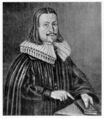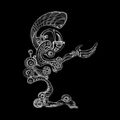Template:Selected anniversaries/July 25: Difference between revisions
No edit summary |
No edit summary |
||
| Line 4: | Line 4: | ||
||1471: Thomas à Kempis dies ... priest and mystic. | ||1471: Thomas à Kempis dies ... priest and mystic. | ||
||1573 (or 1575) | ||1573 (or 1575): Christoph Scheiner born ... astronomer and Jesuit. | ||
File:Andreas Libavius.jpg|link=Andreas Libavius (nonfiction)|1616: Physician, alchemist and chemist [[Andreas Libavius (nonfiction)|Andreas Libavius]] dies. He accepted the Paracelsian principle of using occult properties to explain phenomena with no apparent cause, but rejected the conclusion that a thing possessing these properties must have an astral connection to the divine. | File:Andreas Libavius.jpg|link=Andreas Libavius (nonfiction)|1616: Physician, alchemist and chemist [[Andreas Libavius (nonfiction)|Andreas Libavius]] dies. He accepted the Paracelsian principle of using occult properties to explain phenomena with no apparent cause, but rejected the conclusion that a thing possessing these properties must have an astral connection to the divine. | ||
| Line 43: | Line 43: | ||
||1925: Telegraph Agency of the Soviet Union (TASS) is established. | ||1925: Telegraph Agency of the Soviet Union (TASS) is established. | ||
||1926: Ray Solomonoff born ... inventor of algorithmic probability, his General Theory of Inductive Inference (also known as Universal Inductive Inference), and was a founder of algorithmic information theory. He was an originator of the branch of artificial intelligence based on machine learning, prediction and probability. Pic: https://www.researchgate.net/publication/267090779_Ray_Solomonoff_and_the_New_Probability | |||
||1927: Gene Franklin born ... electrical engineer and control theorist known for his pioneering work towards the advancement of the control systems engineering – a subfield of electrical engineering. Most of his work on control theory was adapted immediately into NASA's U.S. space program, most famously in the control systems for the Apollo missions to the moon in 1960s–70s. Pic. | ||1927: Gene Franklin born ... electrical engineer and control theorist known for his pioneering work towards the advancement of the control systems engineering – a subfield of electrical engineering. Most of his work on control theory was adapted immediately into NASA's U.S. space program, most famously in the control systems for the Apollo missions to the moon in 1960s–70s. Pic. | ||
Revision as of 09:39, 6 November 2018
1616: Physician, alchemist and chemist Andreas Libavius dies. He accepted the Paracelsian principle of using occult properties to explain phenomena with no apparent cause, but rejected the conclusion that a thing possessing these properties must have an astral connection to the divine.
1617: Astronomer, mathematician, and crime-fighter Paul Guldin uses the Guldinus theorem to track down and apprehend math criminals.
1748: Astronomer Charles Messier's interest in astronomy is stimulated by an annular solar eclipse visible from his hometown.
1808: Mathematician Johann Benedict Listing born. He will introduce the term "topology" in a famous article published in 1847, having already used the term in correspondence some years earlier.
1836: New steganographic analysis of famed illustration Niles Cartouchian and Egon Rhodomunde Confront Gnotilus reveals several terabytes of encrypted data.
1837: The first commercial use of an electrical telegraph is successfully demonstrated in London by William Cooke and Charles Wheatstone.
1842: Physician and surgeon Dominique Jean Larrey dies. He was an important innovator in battlefield medicine and triage, and is often considered the first modern military surgeon.
1864: The well-known illustration Asclepius Myrmidon Prepares for Emergency Field Surgery "is a reasonably accurate depiction of events as I experienced them," Judge Havelock tells interviewer.
1920: Chemist and X-ray crystallographer Rosalind Franklin born. She will make contributions to the discovery of the molecular structure of DNA (deoxyribonucleic acid).
1963: Mathematician and physicist Nicholas Metropolis publishes new class of Gnomon algorithm functions which he derived using the Monte Carlo method. He will soon use these new functions to detect and prevent crimes against mathematical constants.
2016: Signed first edition of Lend a Hand used in high-energy literature experiment unexpectedly generates "at least a dozen, perhaps as many as fifteen" organic golems.
2017: Dennis Paulson of Mars observes a minute of silence in memory of the Viking 2 orbiter, which was turned off forty-one years ago, after returning almost 16,000 images in about 700–706 orbits around Mars.












